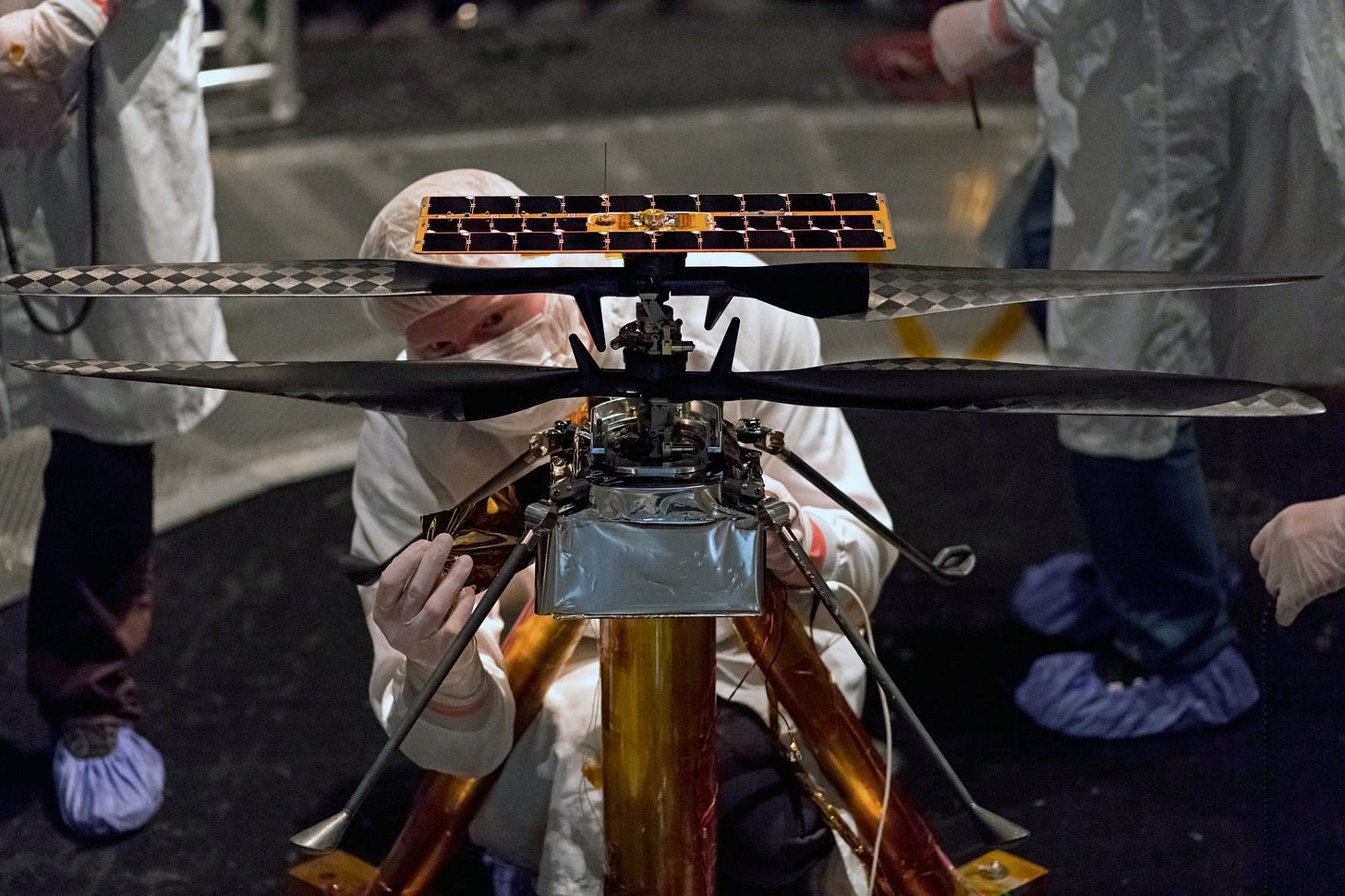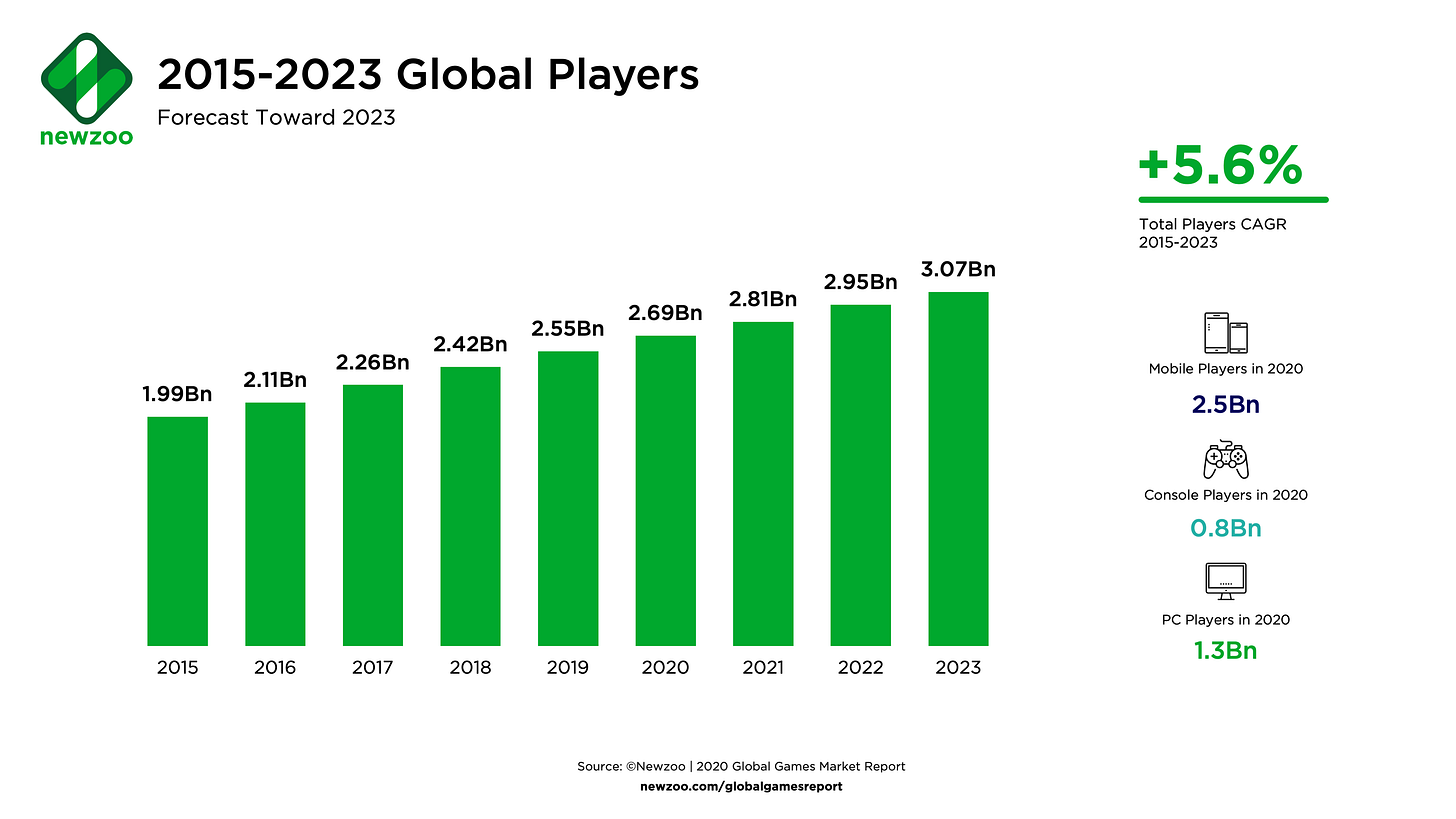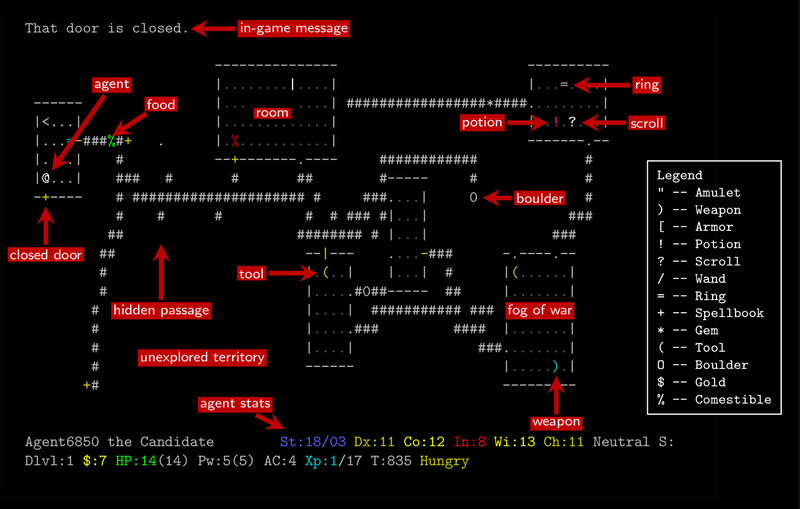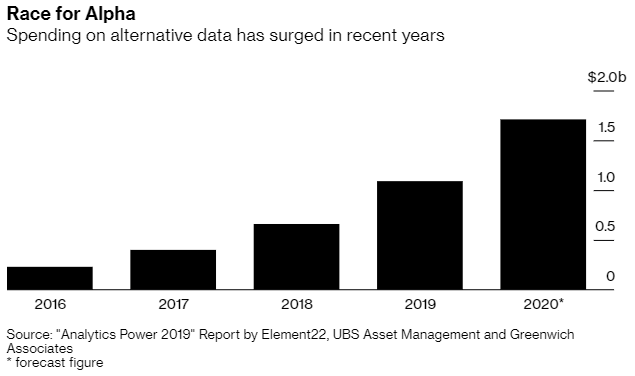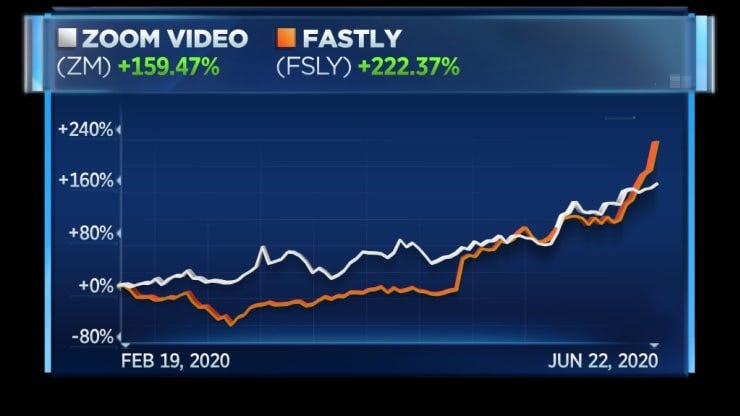Here’s your weekly wrap of technology, innovation, and finance news.
?️ Space
NASA’s next mission to Mars will include an experimental helicopter for the first time which will help with surveying the planet.
If it works, the small helicopter, named Ingenuity, will open a new way for future robotic explorers to get a bird’s-eye view of Mars and other worlds in the solar system.
A mission to Mars by China would put the nation among the world’s space leaders.
Due to launch in July, the mission, if successful, would mark dramatic progress for China’s space program. In recent years it has fielded several lunar landers but made only one attempt on Mars, an orbiter that piggybacked on a failed 2011 Russian mission to the martian moon Phobos.
Virgin Galactic and NASA have launched a new program to train private astronauts for missions to the International Space Station.
Relativity Space, a 3D rocket printing startup, has signed a deal with satellite operator Iridium to launch up to six satellites as early as 2023. Relativity says that by 3D-printing their rockets, they use 100 times fewer parts than traditional rockets, along with a more straightforward supply chain, and this will lead to cost savings for Iridium. Bloomberg also profiled the company.
⚙️ Mobility
Amazon has entered the self-driving car market through the acquisition of Zoox which pits it against Waymo, Cruise, Uber, Tesla, and in all likelihood Apple as well. The company spent over $1 billion acquiring Zoox, and some estimate they’ll need to spend an additional $2 billion per year on development to get the technology to market.
“This fits well into Amazon’s model for automating its distribution network spanning from warehouse robotics, to last mile delivery services,” Somo wrote. He added that the acquisition should “drive operational efficiencies, scale and eventually result in substantial cost savings across their distribution network.”
? Gaming
Newzoo predicts there will be over 3 billion gamers by 2023, or 39% of all humans, driven by demographics (there’s a new gamer born every day) and widespread access to games through mobile devices.
Call of Duty Mobile has shot past 250 million downloads in its first eight months, surpassing where Fortnite and PUBG were at the same point in time after launch. Adapting strong PC franchises for mobile has been a successful strategy for several developers, with NCsoft’s mobile version of Lineage 2 leading to record company profits earlier this year. Nexon’s pending Mobile Dungeon & Fighter launch in China will likely do the same.
CD Projekt held their first Night City Wire episode for Cyberpunk 2077 which included a new trailer and the release of new gameplay footage. I’m impressed, and think this game will be one of the best sellers on next-generation consoles after its November 19 release. Early reviews of the game, which came out after the Night City Wire event, were largely positive.
But with expectations as high as possible and another delay announced earlier this month to give it time to polish, CD Projekt Red is taking a gamble that Cyberpunk 2077 will be worth it. With its abundance of choice around playstyles, character personality, and narrative, the game wants to offer a bit of everything to everyone. It’s a slick action title, a deep and meaty narrative RPG with consequential decision-making, and a wildly immersive simulation of daily urban life in the far future all rolled into one.
After my brief time with an experience that feels worthy of dozens if not hundreds of hours, I’m willing to believe CD Projekt Red may have actually pulled this juggling act off.
Microsoft is shutting down live-streaming service Mixer despite spending tens of millions of dollars to poach popular streamers Ninja and Shroud from Twitch less than a year ago. This just goes to show how difficult it is to disrupt Twitch’s lead, at least in Western markets.
? Health
Could this be a cure for heart disease? A gene-editing experiment in monkeys looks like it has permanently reduced LDL and triglyceride levels, which are associated with a much higher risk of heart disease, heart attacks, and strokes.
Not only did the system work in 13 monkeys, the researchers reported, but it appeared that every liver cell was edited. After gene editing, the monkeys’ LDL levels dropped by 59 percent within two weeks. The ANGPTL3 gene editing led to a 64 percent decline in triglyceride levels.
A new cancer drug from Merck KGaA that targets cancer’s ability to repair its DNA is showing promising results in its phase I trial (see the paper).
The new study, designed to test the drug’s safety, found that half of patients given the new drug either alone or with platinum chemotherapy saw their cancer stop growing, and two patients saw their tumors shrink or disappear completely.
Using CRISPR to edit human embryos may not be safe after new research showed it could result in significant unwanted changes to the genome at or near the target site.
“If human embryo editing for reproductive purposes or germline editing were space flight, the new data are the equivalent of having the rocket explode at the launch pad before take-off,” says Fyodor Urnov, who studies genome editing at the University of California, Berkeley, but was not involved in any of the latest research.
Telehealth startup Ro is hitting record sales each month since it expanded its online pharmacy business before the pandemic started.
? Artificial Intelligence
Facebook AI has released an AI development tool based on NetHack, an amazing ASCII game from 1987. 🙂
? Chips and Computing
A Japanese supercomputer named Fugaku has taken the top spot in Top 500 supercomputer speed rankings, which is the first time a supercomputer based on ARM processors has taken the top place.
Fugaku has successfully taken the top spot in the TOP500 supercomputer tracker from Summit with a score of 415.53 petaflops in the LINPACK benchmark. Summit manages a “mere” 148.6 petaflops, making Fugaku almost three times faster. However, Fugaku has no GPUs. The system has also taken the top spot in measures of AI application processing (HPL-AI), Conjugate Gradients (HPCG), and data-intensive workloads (Graph500). No system has led in all four categories at the same time before. It’s also the first Japanese system to top the rankings in almost a decade.
Apple will stop using Intel chips for their Macs and will instead move to ARM-based processors. This move highlights how far Intel has fallen behind and is a boon for SoftBank (which owns ARM) and TSMC (which will likely be the foundry for the new processors).
Still, ARM-based chips can pack some punch. Benchmarks run on the latest MacBook Air (with an Intel i5 configuration) suggested that its performance wasn’t as fast as the 2018 iPad Pro, which uses Apple’s own ARM-based A12X. In a multi-core test, that tablet had 73 percent faster performance than the new MacBook Air.
A new study shows it’s possible to get an artificial neuron to communicate directly with a biological one using dopamine which potentially lays the groundwork for … cyborgs? (see the paper).
The new study now tackles the other half: chemical computing. It adds a layer of compatibility that lays the groundwork not just for brain-inspired computers, but also for brain-machine interfaces and—perhaps—a sort of “cyborg” future. After all, if your brain can’t tell the difference between an artificial neuron and your own, could you? And even if you did, would you care?
? Cybersecurity
Salesforce has invested an estimated $100 million in security software provider Tanium at a $9 billion valuation.
Tanium’s technology gives IT teams visibility into all those devices that employees are now using from home, an issue that’s becoming more important by the day as the coronavirus pandemic drags on and companies keep their staffers out of the office.
Microsoft has spent $165 million to acquire CyberX, an IoT cybersecurity firm that increases Microsoft’s exposure to security for industrial control systems (see their blog post).
A leak-focused activist group has published BlueLeaks, a 269-gigabyte collection of police data that includes emails, audio, video, and intelligence documents.
? Finance
Bloomberg writes about how everyone is chasing the same alternative data. Trying to generate alpha from alternative data is hard; it’s highly competitive and at best only ever gives you an edge on short-term results. Long-term stock returns are driven by what will happen many years into the future, which isn’t directly observable and thus remains an almost entirely theoretical game.
Canva has raised $60 million at a $6 billion valuation (A$8.7 billion) as it plans to open a new office in Austin, Texas. The raising makes the SAAS design company the most valuable private technology company in Australia, and more valuable than many listed domestic peers (WiseTech A$6.9 billion, SEEK A$7.6 billion).
Zoom is no longer the best-performing work-from-home stock after being surpassed by Fastly. Fastly is a developer-driven content delivery network (CDN) that counts Shopify, Spotify, and Slack as customers. The company should grow revenue by over 40% this year.
Dell is looking to spin off its 81% stake in VMware. VMware’s an interesting business, with an excellent management team, but corporate governance concerns stemming from Dell’s ownership stake have always negatively impacted the stock’s valuation.
Etsy stock has tripled in three months as a surge in face mask sales introduced new shoppers to the platform.
⚡ Other Snippets
I enjoyed this interview with Paul Bassat, co-founder of both Square Peg and SEEK. (As a side note, SEEK was the first big “win” of my investing career as a young analyst; we bought the stock for ~$2.30 in May 2005 on the view the market greatly underestimated the pricing power of the job ad business, and we sold it for ~$7.50 two years later when that became reflected in the price.)
Amazon launched Honeycode, a no-code app building service.
Facebook is facing advertising boycotts from several companies (Unilever, Coca Cola, Verizon, Hershey) after the social media platform was criticised for not doing enough to combat hate speech and disinformation. Facebook has been the most resilient advertising platform during the pandemic largely because their ad slots are highly substitutable and their auction-based pricing model means that the next-highest bid often replaces advertisers that reduce their spending, limiting the impact.
CSIRO scientists in Australia have discovered how to genetically modify cotton to make it coloured.
Human IPO is a startup that lets people sell up to 500 hours of their time on the open market. One share corresponds to one hour of time, and investors can buy shares to make a bet that those hours will be worth more in the future. They can also redeem shares to have a one-on-one meeting.
A prototype US military electroshock weapon can hit a person 100 metres away.
California will require at least 50% of truck sales to be electric by 2035, with the goal of making all new trucks sold in California zero-emission by 2045.
Isaac Asimov’s sci-fi classic Foundation is coming to streaming in 2021 via AppleTV.


